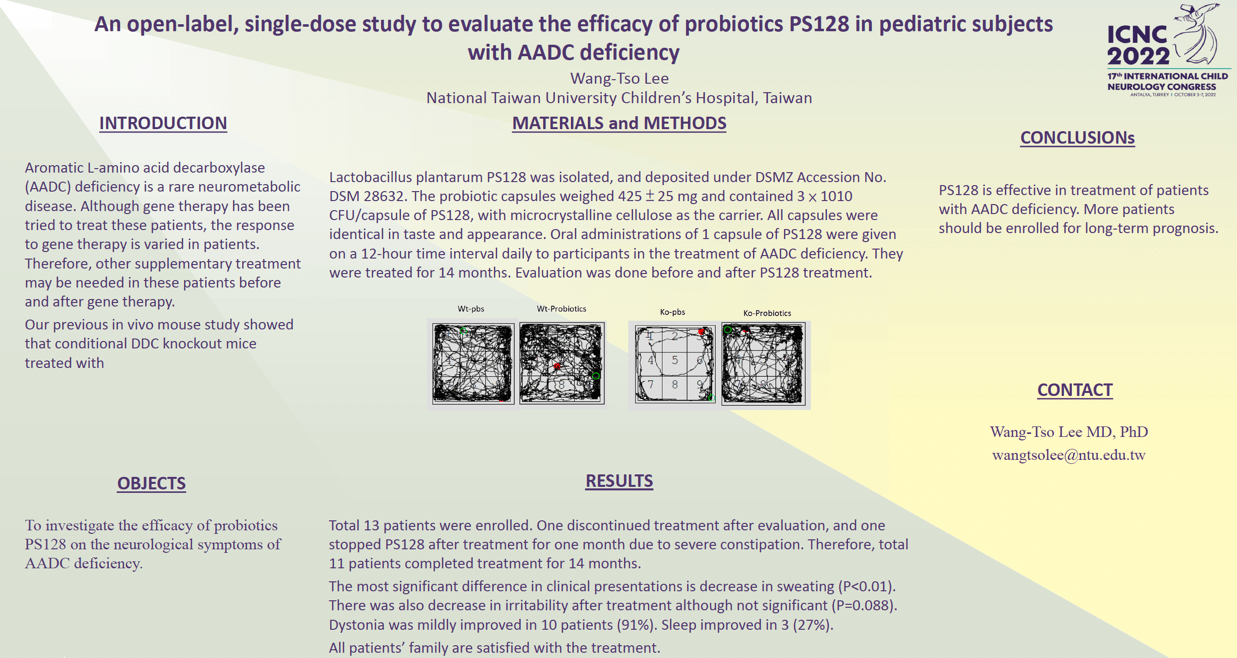An open-label, single-dose study to evaluate the efficacy of probiotics PS128 in pediatric subjects with AADC deficiency
Wang-Tso Lee
Objectives: Aromatic L-amino acid decarboxylase (AADC) deficiency is a rare neurometabolic disease. Although gene therapy has been tried to treat these patients, the response to gene therapy is varied in patients. Therefore, other supplementary treatment may be needed in these patients before and after gene therapy. Methods: Lactobacillus plantarum PS128 was isolated, and deposited under DSMZ Accession No. DSM 28632. The probiotic capsules weighed 425 ± 25 mg and contained 3 × 1010 CFU/capsule of PS128, with microcrystalline cellulose as the carrier. All capsules were identical in taste and appearance. Oral administrations of 1 capsule of PS128 were given on a 12-hour time interval daily to participants in the treatment of AADC deficiency. They were treated for 14 months. Evaluation was done before and after PS128 treatment. Results: Total 13 patients were enrolled. One discontinued treatment after evaluation, and one stopped PS128 after treatment for one month due to severe constipation. Therefore, total 11 patients completed treatment for 14 months. The most significant difference in clinical presentations is decrease in sweating (P<0.01). There was also decrease in irritability after treatment although not significant (P=0.088). Dystonia was mildly improved in 10 patients (91%). Sleep improved in 3 (27%). All patients’ family are satisfied with the treatment. Conclusion: PS128 is effective in treatment of patients with AADC deficiency. More patients should be enrolled for long-term prognosis
Keywords: AADC deficiency, probiotics
Wang-Tso Lee
National Taiwan University Children’s Hospital
Taiwan
Objectives: Aromatic L-amino acid decarboxylase (AADC) deficiency is a rare neurometabolic disease. Although gene therapy has been tried to treat these patients, the response to gene therapy is varied in patients. Therefore, other supplementary treatment may be needed in these patients before and after gene therapy. Methods: Lactobacillus plantarum PS128 was isolated, and deposited under DSMZ Accession No. DSM 28632. The probiotic capsules weighed 425 ± 25 mg and contained 3 × 1010 CFU/capsule of PS128, with microcrystalline cellulose as the carrier. All capsules were identical in taste and appearance. Oral administrations of 1 capsule of PS128 were given on a 12-hour time interval daily to participants in the treatment of AADC deficiency. They were treated for 14 months. Evaluation was done before and after PS128 treatment. Results: Total 13 patients were enrolled. One discontinued treatment after evaluation, and one stopped PS128 after treatment for one month due to severe constipation. Therefore, total 11 patients completed treatment for 14 months. The most significant difference in clinical presentations is decrease in sweating (P<0.01). There was also decrease in irritability after treatment although not significant (P=0.088). Dystonia was mildly improved in 10 patients (91%). Sleep improved in 3 (27%). All patients’ family are satisfied with the treatment. Conclusion: PS128 is effective in treatment of patients with AADC deficiency. More patients should be enrolled for long-term prognosis
Keywords: AADC deficiency, probiotics
Wang-Tso Lee
National Taiwan University Children’s Hospital
Taiwan

Wang-Tso Lee
National Taiwan University Children’s Hospital Taiwan
National Taiwan University Children’s Hospital Taiwan